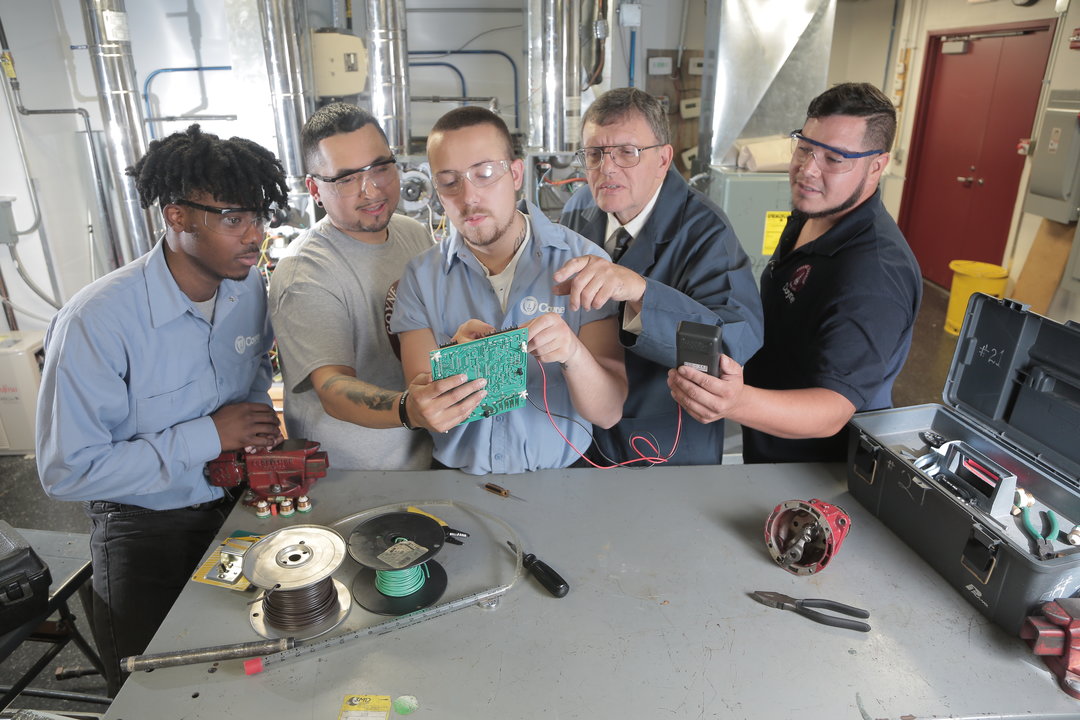Have you ever thought that you’re not cut out for the college lifestyle? Do you want to pursue a career sooner rather than later? Maybe you don’t want to spend four years of your life partying or sitting in impractical classes you don’t enjoy when you could be training for a career that you love. If so, then trade school might be a great investment for you. Trade school careers are good options for those who want to learn a solid skill – like nursing or working as an electrician or plumber – and, best of all, many of these careers are quite high-paying considering the time you put into the schooling vs. the entry-level salary you receive when you graduate. Why chose trade school over college? Here is an overview of the benefits of attending trade school and what your career options might be depending on the trade you pick.
Trade School vs. College
1. Trade School
Trade school once carried a stigma of a school that is more advanced than high school but still not quite college. If you choose trade school vs college, you’re likely looking at two years of full-time school in a practical, career-oriented line of work like electrical or HVAC technology, medical assisting, construction, or nursing. Degrees conferred at a trade school will likely be certificate programs or Associate of Arts or Associate of Science degrees.
2. College
When most people talk about going to “college”, they mean a four-year public or private institution. Degrees conferred at a four-year institution are usually a Bachelor of Science, Bachelor of Arts, or perhaps a Bachelor of Fine Arts if you study a creative subject like film, studio art, or creative writing and you create a portfolio for your senior project.
Benefits of Choosing Trade School
If you’re a millennial, you’ve probably grown up hearing from your parents that you need to “make good grades and get into college”, not “college or trade school”, but what if you are not academically inclined or you have no patience for literature, foreign language, and theory? Maybe you’ve got a gift for practical thinking, or you might have an intuitive understanding of welding or how electrical wiring works.
- Career Path
Though there is much benefit to a liberal arts education, it’s not always a practical choice to attend a four-year college and major in English or Philosophy. Majors like this, unless you have a solid career plan, might leave you high and dry and scrambling for unrelated work after you graduate. The demand for essential workers such as electricians, nurses, pharmacy technicians, and plumbers are needed to help keep communities running. - Apprenticeships
If you choose a four-year college, the closest thing you might get to a modern apprenticeship is an internship, during which you might be learning the tricks of a new trade, like working at a news station or creating important spreadsheets, or you might be fetching coffee and taking notes in meetings. At a trade school, you can take advantage of genuine vocational school training. You’re learning a real-world skill, after all, and there’s no room for a nurse who doesn’t know his or her vital signs or an electrician who doesn’t understand the basics of household wiring. - Lower Tuition
Many trade schools boast affordable tuition rates. For example, in 2019-2020, the average college tuition paid was $41,426 at private college, and on the lower end, $11,260 for in-state residents at state schools. In comparison, two-year colleges and trade schools might cost you about $7,345. Combining this lower overall cost with in demand careers makes trade school a great bet – especially in these uncertain, post-COVID times.

Popular in Trade School
Medical Assistant or Pharmacy Technician
These two trade school jobs are likely to provide great entry-level pay, exciting career options, and a lot of flexibility. Do you see yourself working in a pediatrician’s office? How about filling prescriptions and communicating with patients about their medication regimens at a local, family-owned pharmacy?
There are numerous options for medical assistants, who can work in the front of the office or in the back, where they might process patient histories or even take patient vitals, like heart rate and blood pressure.
Pharmacy techs have the responsibility of communicating with both pharmacists and patients to make sure their medications are correctly filled, and they can get patients’ help from a licensed pharmacist if needed. If you want to pursue this career, the time is right: the median salary for medical assistants is currently $34,800 per year, according to the Bureau of Labor Statistics, and job growth is rated at 23% over the next 10 years.
Electrical Technology
Electricians are often in high demand as they have a specific set of skills that might include installing and repairing construction wiring in both commercial in residential developments, working with lighting, or maintaining electrical control systems. Their current median salary is $56,180 per year and job growth is projected at 10% for the next 10 years.
If you’re the type of person who envisions going to school to learn what’s necessary for a job, working immediately after graduation, and making a great starting salary, then trade school might be right for you.
Contact Coyne College to discuss admission for a trade school in Chicago and to begin planning your future today.



